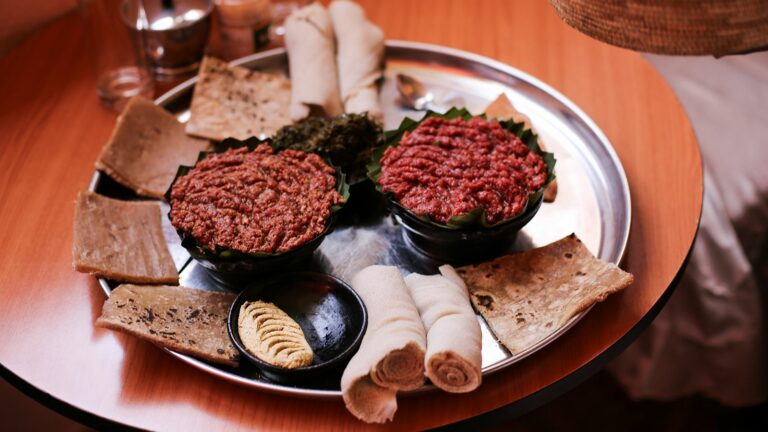Introduction
Ethiopian cuisine is known for its diverse flavors, colorful dishes, and unique cooking techniques. However, for individuals who are gluten intolerant or have celiac disease, the question of whether Ethiopian cuisine is gluten-free may be a concern. In this article, we will explore the connection between gluten and Ethiopian cuisine, common Ethiopian dishes, and gluten-free options available.
Gluten and Ethiopian cuisine
Gluten is a protein found in wheat, barley, and rye, which can cause digestive issues for some individuals. In Ethiopian cuisine, injera, a spongy flatbread, is a staple and is traditionally made from teff flour. Teff is a gluten-free grain, which makes injera a safe option for individuals with gluten intolerance or celiac disease. However, injera made from other flours such as wheat, barley or rye may contain gluten.
Common Ethiopian dishes
Ethiopian cuisine is known for its spicy stews, curries, and vegetable dishes, which are usually served with injera. Some of the popular dishes include doro wat, a chicken stew made with Ethiopian spices, berbere, and niter kibbeh, and vegetable dishes such as shiro and gomen. Most of these dishes are naturally gluten-free, but it’s always best to check with the restaurant or cook to ensure that no gluten-containing ingredients have been added.
Gluten-free Ethiopian options
If you are looking for gluten-free options, there are several dishes that you can choose from, including injera made from teff flour, lentil or chickpea stews, and vegetable dishes such as tikil gomen, a cabbage and carrot dish, and fasolia, a green bean dish. However, it’s essential to confirm with the restaurant or cook that these dishes are free from gluten.
Gluten-free Ethiopian breads
Apart from injera, there are other gluten-free Ethiopian bread options available, such as kocho, a bread made from enset, a root vegetable similar to a banana plant, and quanta firfir, a bread made from dried beef or lamb mixed with spices and chili powder.
Ethiopian spices and seasonings
Ethiopian cuisine is known for its unique blend of spices, which give the dishes their distinctive flavor. Some of the common spices used in Ethiopian cuisine include berbere, a blend of chili pepper, ginger, garlic, and other spices, and mitmita, a spicy blend of chili pepper and other spices. While these spices are naturally gluten-free, it’s essential to check the labels to ensure that they are not mixed with any gluten-containing ingredients.
Eating Ethiopian food outside of Ethiopia
If you are traveling outside of Ethiopia and craving Ethiopian cuisine, it’s essential to do your research and find a restaurant that offers gluten-free options. Some Ethiopian restaurants may use other flours to make injera, which may contain gluten. It’s always best to call ahead and confirm with the restaurant if they offer gluten-free options.
Conclusion
Ethiopian cuisine is a unique and flavorful option for individuals with gluten intolerance or celiac disease. With a range of gluten-free options available, such as injera made from teff flour, vegetable and lentil stews, and gluten-free bread options, Ethiopian cuisine can be a safe and enjoyable dining experience. However, it’s crucial to confirm with the restaurant or cook to ensure that the dishes are free from gluten.

